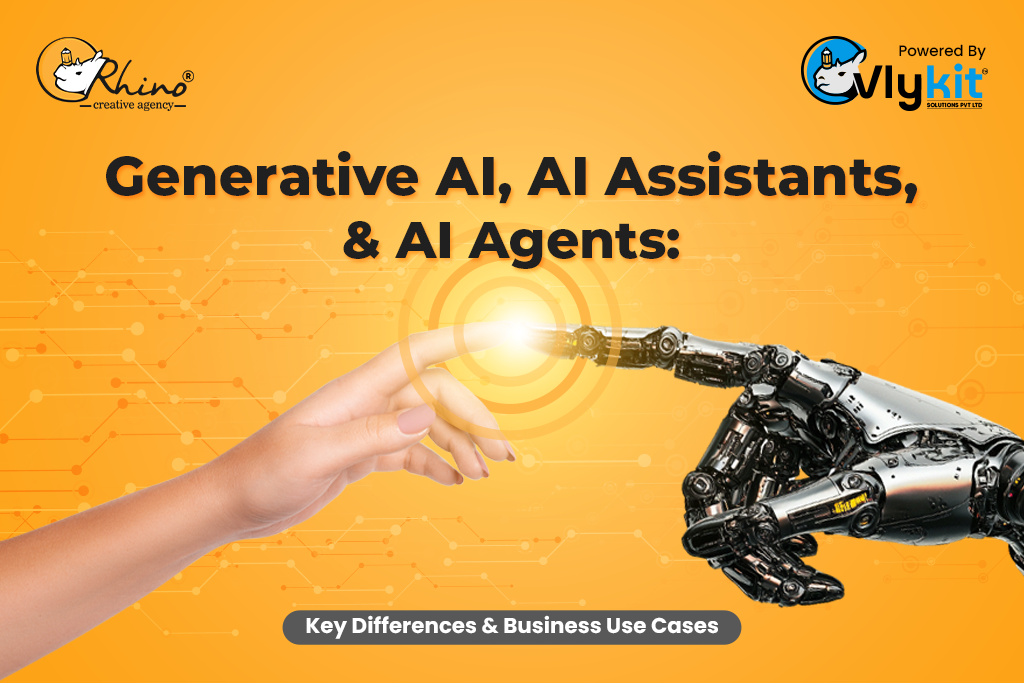Artificial Intelligence (AI) is rapidly transforming the way businesses operate from automating routine tasks to generating creative content, making strategic decisions, and even acting independently to complete goals. But not all AI is built the same. As we head deeper into 2025, three primary types of AI are leading the evolution: Generative AI, AI Assistants, and AI Agents (Agentic AI).
In this blog, we’ll break down the differences, functionalities, pros and cons, use cases, financial implications, and help you decide which is the best fit for your business or if a combination is ideal.
1. What Is Generative AI?
Definition:
Generative AI refers to models that create new content text, images, audio, code, or videos, by learning patterns from large datasets. Examples include ChatGPT, Midjourney, DALL·E, and GitHub Copilot.
How It Works:
Generative AI uses machine learning models (like transformers) to produce content by predicting the next best output based on the input data it was trained on.
Key Functionalities:
- Text generation (blogs, ad copy, emails)
- Image & video creation
- Code generation
- Data synthesis
- Idea generation and brainstorming
Pros:
- Extremely versatile in content creation
- Saves time and human effort
- Enhances creativity at scale
- Can be customized with fine-tuning
Cons:
- May generate inaccurate or biased content
- Requires supervision in sensitive domains
- Licensing and copyright issues for creative outputs
2. What Are AI Assistants?
Definition:
AI Assistants are tools designed to assist users in tasks through conversation or task execution, typically responding to prompts or commands. They don’t act independently but are highly efficient helpers.
Popular Examples:
- Siri, Alexa, Google Assistant
- Chatbots on websites
- Virtual assistants like ChatGPT used in productivity tools
Key Functionalities:
- Answering questions
- Setting reminders or sending emails
- Basic automation (booking appointments, data lookup)
- Customer support and ticket routing
Pros:
- Enhances user convenience
- Reduces customer service costs
- Easy to implement across departments
- High adoption across industries
Cons:
- Limited to predefined tasks
- Often lacks deep contextual understanding
- Can’t operate autonomously or make decisions
3. What Are AI Agents (Agentic AI)?
Definition:
AI Agents also called Agentic AI, are autonomous systems capable of making decisions, taking actions, and adapting to complex environments to fulfil objectives. They don’t just respond they plan, prioritize, and act on their own.
How They Work:
AI agents operate using a mix of planning algorithms, feedback loops, memory, and sometimes reinforcement learning. They can break down a high-level goal into sub-tasks and execute them in sequence.
Key Functionalities:
- Autonomous decision-making
- Goal-oriented task execution
- Workflow orchestration
- Multi-step reasoning with memory and tools
Examples:
- AutoGPT, BabyAGI
- AI agents integrated into business workflows for lead nurturing, fraud detection, or market analysis
Pros:
- Hands-free automation of complex tasks
- Saves time for high-level strategic roles
- Scalable across departments
- Continuously learns and adapts
Cons:
- Still experimental in many domains
- Higher costs and complexity
- Requires careful guardrails and monitoring
- May go off-track without proper design
4. Business Use Cases: Which AI Fits Where?
| Business Function | Generative AI | AI Assistants | AI Agents |
| Marketing | Content creation, ad copy | Campaign scheduling | Campaign performance optimization |
| Customer Support | Auto-reply templates | Chatbots & helpdesks | End-to-end query resolution |
| Product Development | Idea generation, code generation | Task reminders, document fetching | Iterative prototyping |
| Sales | Email templates, product pitches | CRM data lookup | Lead qualification and nurturing |
| Operations | Process documentation | Meeting scheduling | Workflow automation |
| Finance | Report drafting | Budget inquiries | Anomaly detection, forecasting |
5. Financial Considerations & ROI
| AI Type | Setup Cost | Maintenance | Customization | ROI Potential |
| Generative AI | Medium | Medium | High | High (content-heavy orgs) |
| AI Assistants | Low | Low | Medium | Medium-High |
| AI Agents | High | High | High | Very High (if implemented right) |
Generative AI is cost-effective for marketing-heavy companies or content-driven teams.
AI Assistants are great for SMBs looking for quick wins in customer experience.
AI Agents require upfront investment but offer long-term operational excellence.
6. Current Trends In 2025
- Generative AI is becoming enterprise-ready with secure APIs and in-house models.
- AI Assistants are being integrated into business tools like Slack, Notion, and Salesforce.
- AI Agents are moving from experimental to production use in logistics, finance, and IT ops.
Agentic AI is expected to grow 10x faster in enterprise adoption between 2025–2027 (according to McKinsey & Gartner projections), driven by the need for end-to-end automation.
7. Which AI Type Is Best For Your Business?
| Business Type | Recommended AI Type |
| Content & Media Companies | Generative AI |
| E-commerce & Retail | AI Assistants + AI Agents |
| IT & SaaS | AI Agents + Generative AI |
| Customer Support Businesses | AI Assistants |
| Finance & Legal Firms | AI Agents (with compliance AI) |
| Startups & Small Businesses | AI Assistants (low barrier) |
8. Verdict: Which One Wins Overall?
There’s no one-size-fits-all. However:
- If your goal is creativity and speed → Choose Generative AI
- If you need task efficiency & interaction → Opt for AI Assistants
- If you’re looking for autonomous, scalable productivity → Invest in AI Agents
Winning Combo For 2025:
Start with Generative AI + Assistants for quick wins, and layer in AI Agents as your business scales.
Final Thoughts
As AI continues to evolve, the smartest businesses will not just choose between generative AI, assistants, and agents they’ll orchestrate all three to build a smarter, faster, and more autonomous organization.
Whether you’re a start-up, an SME, or a large enterprise, understanding and implementing the right kind of AI can be your most powerful move in 2025.

